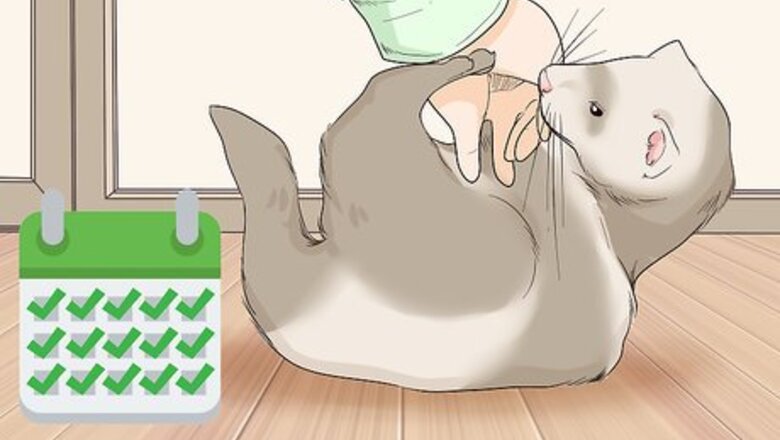
views
Playing with your Ferret
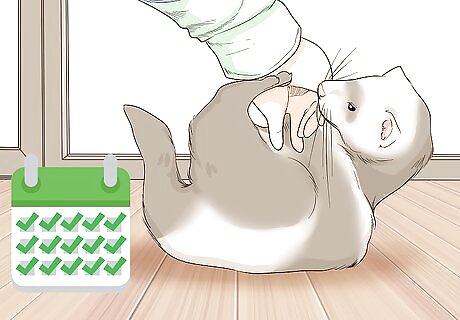
Set aside play time every day. Ferrets need a lot of attention, and they should receive a considerable amount of out of cage time every day. Make sure you have at least an hour to play one-on-one with your ferret on a daily basis, as too much cage time can lead to stress and illness. Ferrets are very intelligent and active, so you need to be engaged in play. This is especially important for single ferrets, who can get bored without a companion. Take time every day to play with your ferret in ways that offer both physical and mental stimulation. Single ferrets need more attention than ferrets kept in pairs or groups. An hour is the minimum amount of time you should spend playing with your ferret on a daily basis.

Use a towel to make a game. Take an old towel and wiggle it around your ferret to get them interested. Your ferret will start to chase after the towel. When they catch an edge, you can pull your ferret around the room. When they let go, start the whole game over again. This game also works with rope tug-of-war style toys, available from most pet stores.
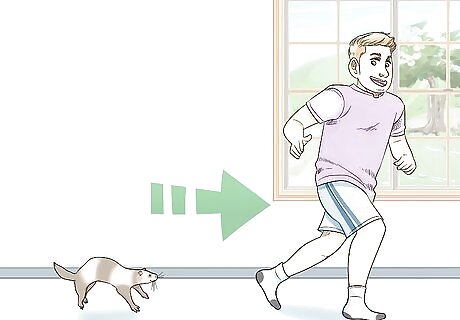
Play tag. Ferrets like chasing, and they like to be chased. This makes tag a perfect game for a solo ferret. Chase your ferret around the room and gently tap it's head or body to tag it. Then, start running away from your ferret and let it catch you. Go back and forth as much as you and your ferret are both willing. To make the game more fun for your ferret, get down on your hands and knees. This puts you closer to their level. Ferrets are notorious toe biters, so be sure to wear closed-toed shoes when playing a game where your ferret is supposed to catch you.
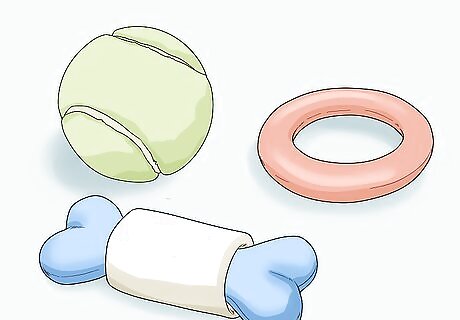
Keep plenty of toys around your house. Like dogs or cats, ferrets love playing with toys. They will tug on them, chase them, and chew on them. Keep some hard rubber balls, rope toys, and other sturdy toys around the house that your ferret can bring out during playtime. The toys do not have to be made specifically for ferrets. Many dog and cats toys will work. Just make sure the toys are thick and firm enough that your ferret can't chew through them, and small enough that your ferret can move them around. Make sure that you are always there to supervise when you introduce a new toy to your ferret. You want to make sure that your ferret will play with the toy safely and that they won't swallow any pieces of it.
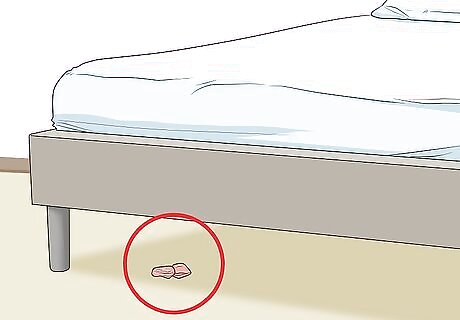
Hide treats around the house. Hiding treats allows your ferret to mimic some hunting behaviors. This game challenges their mind while keeping them active. Put a few ferret treats in different areas around your house, such as in a corner or under some furniture. Then, allow your ferret to run around and find them. This is a great game for single ferrets, since they do not have to compete for treats.
Making Ferret Enrichment Bins
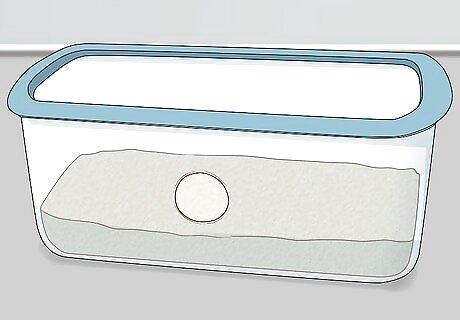
Build a dig box. Take a plastic storage bin or children's pool and fill it with four to five inches (10 to 13 cm) of dirt or long grain rice. Hide toys and treats in the in the bin, and let your ferret dig around to find hidden treasures. If you choose to use rice, make sure it is not instant. Instant rice can cause intestinal blockages when swallowed uncooked.
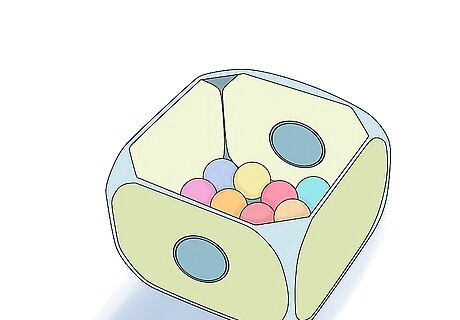
Make a ball pit. Similar to a dig box, a ball pit allows your ferret to play around and explore new surfaces. Add layers of ping pong balls to a storage bin, along with some of your ferret's favorite toys. Then, simply allow your ferret to explore. There should be enough balls in the bin that your ferret can move between them, but not so many that they are completely submerged.
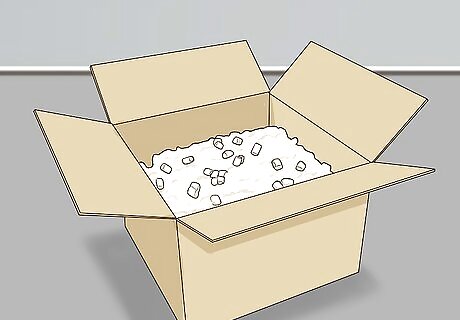
Use cornstarch packing peanuts. Packing peanuts make another great option for your ferret to play around in. Just be sure to use the cornstarch variety instead of the styrofoam ones. These dissolve in water, and won't cause intestinal blockages if chewed and swallowed.
Making Your Home Ferret Friendly
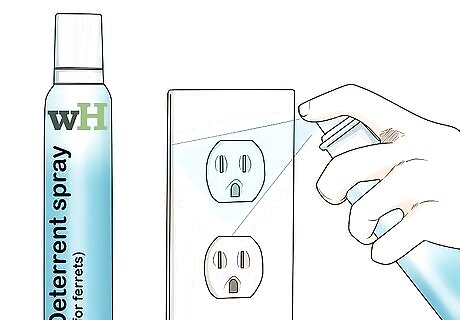
Ferret-proof your house. Ferrets can bite and claw their way through your house, and they are prone to getting stuck in tight areas. Move any items that your ferret could chew or swallow to a secure location, and add latches to low-lying cabinets and drawers. For hazards that can't be moved, block them off as best as you can. If you have a sofa with wooden legs, for example, you may consider swapping the legs out with a more durable material, like metal. Electrical cords and outlets are serious hazards, so make sure they are all covered completely. You can also use a deterrent spray to keep ferrets away from electrical hazards.
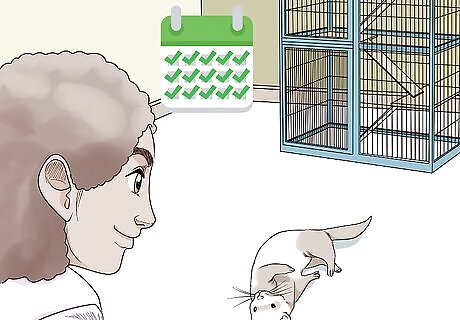
Let your ferret out of its cage every day. In addition to your active play time, give your ferret a couple hours out of its cage to explore every day. This is especially important for single ferrets, who don't have any friends to play with throughout the day. In total, a ferret should be out of its cage for a minimum of four hours every day, but the more time they get out, the better. You do not need to be actively chasing or playing with your ferret during the entirety of its out of cage time. Make sure they have access to toys, as well as food and water when they out, though, so that they can keep themselves stimulated.
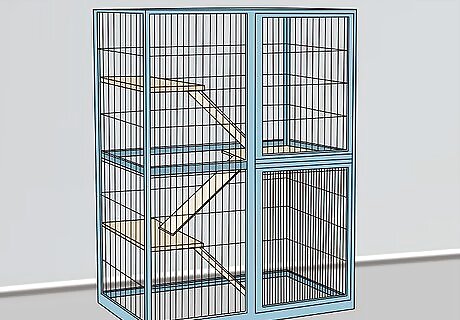
Give your ferret a cozy cage. A single ferret needs a cage with room to play and room to rest. Many ferret owners choose two story cages for this reason. Keep food, water, and a cosy hammock up top for your ferret to relax, and put toys, a litter box, and obstacles like pvc pipes and play tents in the bottom so that your ferret can entertain themselves.
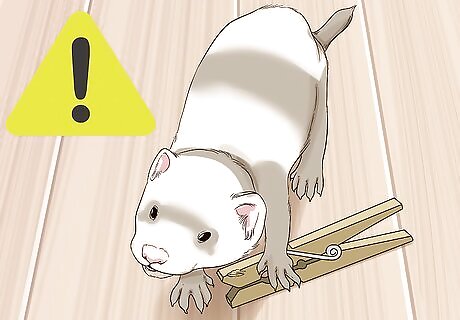
Watch carefully for stashing behaviors. Ferrets love to stash things away, and single ferrets often have many stashes. Some of their favorite items include food, socks, cardboard rolls, pens, potatoes, money, and keys. There isn't much you can do to stop a ferret from stashing, but you should keep a close watch for stashing behaviors while they are out of the cage. If you find a ferret's stash, remove any objects that are dangerous. Some stashed goods, like cardboard toilet paper rolls, can get stuck on your ferret and make it hard for them to see or move, which may lead them act erratically and hurt themselves. Other stashed items, like pens and shoe insoles, could cause obstructions in their digestive tracts if they are accidentally ingested.
















Comments
0 comment